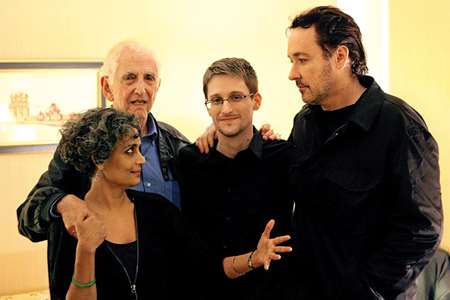by ARUNDHATI ROY and JOHN CUSACK
 Room 1001, Ritz Carlton, Moscow: Edward Snowden’s exiled quarters where actor-writer John Cusack brings Arundhati and Dan Ellsberg to meet him–Ole Von Uexküll
Room 1001, Ritz Carlton, Moscow: Edward Snowden’s exiled quarters where actor-writer John Cusack brings Arundhati and Dan Ellsberg to meet him–Ole Von Uexküll
Every nation-state tends towards the imperial—that is the point. Through banks, armies, secret police, propaganda, courts and jails, treaties, taxes, laws and orders, myths of civil obedience, assumptions of civic virtue at the top. Still it should be said of the political left, we expect something better. And correctly. We put more trust in those who show a measure of compassion, who denounce the hideous social arrangements that make war inevitable and human desire omnipresent; which fosters corporate selfishness, panders to appetites and disorder, waste the earth.
—Daniel Berrigan
poet, Jesuit priest
***
One morning as I scanned the news—horror in the Middle East, Russia and America facing off in the Ukraine, I thought of Edward Snowden and wondered how he was holding up in Moscow. I began to imagine a conversation between him and Daniel Ellsberg (who leaked the Pentagon Papers during the Vietnam war). And then, interestingly, in my imagination a third person made her way into the room—the writer Arundhati Roy. It occurred to me that trying to get the three of them together would be a fine thing to do.
I had heard Roy speak in Chicago, and had met her several times. One gets the feeling very quickly with her and comes to the rapid conclusion that there are no pre-formatted assumptions or givens. Through our conversations I became very aware that what gets lost, or goes unsaid, in most of the debates around surveillance and whistleblowing is a perspective and context from outside the United States and Europe. The debates around them have gradually centred around corporate overreach and the rights of privacy of US citizens.
The philosopher/theosophist Rudolf Steiner says that any perception or truth that is isolated and removed from its larger context ceases to be true.
“When any single thought emerges in consciousness, I cannot rest until this is brought into harmony with the rest of my thinking. Such an isolated concept, apart from the rest of my mental world, is entirely unendurable…there exists an inwardly sustained harmony among thoughts…when our thought world bears the character of inner harmony, we can feel we are in possession of the truth…. All elements are related one to the other…every such isolation is an abnormality, an untruth.” In other words, every isolated idea that doesn’t relate to others yet is taken as true (as a kind of niche truth) is not just bad politics, it is somehow also fundamentally untrue…. To me, Arundhati Roy’s writing and thinking strives for such unity of thought. And for her, like for Steiner, reason comes from the heart.
I knew Dan and Ed because we all worked together on the Freedom of Press Foundation. And I knew Roy admired both of them greatly, but she was disconcerted by the photograph of Ed cradling the American flag in his arms that had appeared on the cover of Wired. On the other hand, she was impressed by what he had said in the interview—in particular that one of the factors that pushed him into doing what he did was the NSA’s (National Security Agency) sharing real-time data of Palestinians in the United States with the Israeli government.
…
AR: Conflating the two the way I just did is stupid…walking into a trap—it makes it easy for people to say, “Oh, she’s anti-American, he’s anti-American”, when we’re not. Of course not. There are things I love about America. Anyway, what is a country? When people say, “Tell me about India”, I say, “Which India?…. The land of poetry and mad rebellion? The one that produces haunting music and exquisite textiles? The one that invented the caste system and celebrates the genocide of Muslims and Sikhs and the lynching of Dalits? The country of dollar billionaires? Or the one in which 800 million live on less than half-a-dollar a day? Which India?” When people say “America”, which one? Bob Dylan’s or Barack Obama’s? New Orleans or New York? Just a few years ago India, Pakistan and Bangladesh were one country. Actually, we were many countries if you count the princely states…. Then the British drew a line, and now we’re three countries, two of them pointing nukes at each other—the radical Hindu bomb and the radical Muslim bomb.
JC: Radical Islam and US exceptionalism are in bed with each other. They’re like lovers, methinks….
AR: It’s a revolving bed in a cheap motel…. Radical Hinduism is snuggled up somewhere in there, too. It’s hard to keep track of the partners, they change so fast. Each new baby they make is the latest progeny of the means to wage eternal war.
JC: If you help manufacture an enemy that’s really evil, you can point to the fact that it’s really evil, and say, “Hey, it’s really evil.”
AR: Your enemies are always manufactured to suit your purpose, right? How can you have a good enemy? You have to have an utterly evil enemy—and then the evilness has to progress.
Z Communications for more
